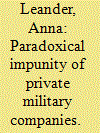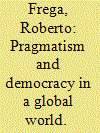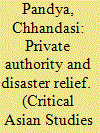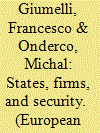|
|
|
Sort Order |
|
|
|
Items / Page
|
|
|
|
|
|
|
| Srl | Item |
| 1 |
ID:
186105


|
|
|
|
|
| Summary/Abstract |
This article provides empirical evidence of the emergence of new private governance forms through three case studies: transboundary air pollution, green supply chain, and energy transition in Northeast Asia. This article also refers to private governance theories discussed in the context of global environmental governance. Consistent with the private authority theory, entrepreneurs with vast expertise and capacity to provide useful information and practices have emerged. They allow stakeholders to cooperate in regional environmental sustainability under the conditions of weak or no focal institutions and heterogeneous state preferences. This observation is consistent with the global trend of environmental governance, which is shifting from regulatory-based to goal-setting governance. As global partnership theory suggests, hybrid forms of private governance, including various local- to global-level public–private partnerships, emerge across the cases. However, these forms of governance are still in the embryonic stage, where their functions of private authority are not fully developed. These insights challenge the predominant view on the limited roles of nonstate actors in building regional environmental governance in Northeast Asia as discussed in the existing literature.
|
|
|
|
|
|
|
|
|
|
|
|
|
|
|
|
| 2 |
ID:
101000


|
|
|
|
|
| Publication |
2010.
|
| Summary/Abstract |
The impunity of private military companies (PMCs) appears increasingly puzzling. Not only is there widespread awareness and public debate about violations of the spirit - if not the letter - of the law; there is also a 'mad scramble' to improve regulation. In spite of this, legal accountability remains problematic. This situation is usually explained either as an expression of the techno-legal difficulties created by the move from government to governance or as reflecting the social, political and economic capital of PMCs. By contrast, this article suggests that the paradox of PMC impunity is best understood by reference to the particular form of authority such organizations enjoy - that is, by reference to their 'symbolic' capital. The article shows that PMC authority is grounded in three interrelated discourses/practices relative to risk/security, market governance and exercise of the state's monopoly on violence. These leave an imprint on the legal accountability sought. The centrality of the risk/security discourse paves the way for exceptionalism; that of the role of market governance for ad-hocism; and that of the discourse of respect for the state's monopoly on violence for inconsequentialism. The result is the coexistence of PMCs' relative impunity with intense contestation and legal innovation.
|
|
|
|
|
|
|
|
|
|
|
|
|
|
|
|
| 3 |
ID:
154914


|
|
|
|
|
| Summary/Abstract |
The Freedom in the World (FITW) ratings of countries’ freedom, created by Freedom House in 1972, are widely used by many U.S. audiences, including journalists, policymakers, and scholars. Why and how did these ratings acquire private authority in the United States? Furthermore, why and to what extent have they retained private authority over time and across different audiences? Contrary to previous research on private authority, which emphasizes the role of raters’ expertise and independence, I advance an argument that emphasizes the role of ideological affinity between raters and users. Specifically, I argue that ratings are more likely to have authority among actors that share raters’ ideas about concept definition and coding. I also argue that ratings are more likely to have authority among weak actors that depend on powerful other users of the ratings. Diverse evidence and methods—including data on the ratings’ usage, an internal archive of Freedom House records, interviews with key informants, and a statistical analysis of bias—support the argument.
|
|
|
|
|
|
|
|
|
|
|
|
|
|
|
|
| 4 |
ID:
155158


|
|
|
|
|
| Summary/Abstract |
This article discusses the advantages of a pragmatist theory of global democracy for understanding the political relevance of new phenomena such as the emergence of forms of private authority and transnational movements in tackling with global issues. The article shows in particular that the pragmatist notion of ‘publics’ offers promising insights and proves particularly promising for completing the transition from methodological nationalism to methodological cosmopolitanism that is required to understand new normative practices developing at the global level and to inquire into their conditions of validity. After having presented a basic outline of the pragmatist theory of democracy, I discuss the contribution of pragmatism to the critique of methodological nationalism and proceed then to examine and reject two alternative approaches to global politics – transnational public sphere theory and global representation theory – showing why they fail to overcome methodological nationalism. The last two sections explore private entrepreneurial authority in contexts of global governance and shows that pragmatism succeeds in explaining their political role, while the other two approaches fail.
|
|
|
|
|
|
|
|
|
|
|
|
|
|
|
|
| 5 |
ID:
072691


|
|
|
|
|
| Publication |
2006.
|
| Summary/Abstract |
This article explores the rise of private authority in globalized disaster relief scenarios by looking at the case of nongovernmental organizations (NGOs) operating in Aceh and its neighboring region, Nias, after the December 2004 Indian Ocean tsunami. The author places the growing strength and presence of NGOs within the larger context of weak, cash-strapped local governments under decentralization schemes promoted by neoliberal economic policies and argues that under such conditions, private actors such as NGOs are gaining a legitimacy of authority once reserved exclusively for the state. In Aceh after the tsunami, five hundred NGOs began operating relief and recovery efforts on the island with little consultation with local Acehnese government agencies and community organizations. The article concludes by arguing that the example of Aceh, in which public and private parallel systems of relief and recovery have been operating raises long-term issues of accountability for all parties involved.
|
|
|
|
|
|
|
|
|
|
|
|
|
|
|
|
| 6 |
ID:
073990


|
|
|
|
|
| Publication |
2006.
|
| Summary/Abstract |
This article confronts the problem of private authorities engaging in rule-making activities for public purposes. This form of rule-making raises questions about the justice, authority and, most importantly, legitimacy of these institutional arrangements. The private authority that creates rules in the international financial system relies on claims of efficiency and expertise. These claims focus on the rules created rather than the institutions that create them, institutions that are private and thus self-interested in a different way from public authorities. The article explores these issues through a review of the role of banks that engage in rule-making at the global level.
|
|
|
|
|
|
|
|
|
|
|
|
|
|
|
|
| 7 |
ID:
178502


|
|
|
|
|
| Summary/Abstract |
While the current practice of the United Nations Security Council, the European Union, and the United States leans towards imposing only targeted sanctions in most of the cases, private actors often complain about inability to process financial transactions, ship goods, or deliver services in countries where sanctions targets are located. The impact of sanctions often ends up being widespread and indiscriminate because sanctions are implemented by for-profit actors. This article investigates how for-profit actors relate to the imposition of sanctions, how they reflect them in their decisions, and how they interact with the public authorities. The findings of our research show that for-profit actors, with the possible exception of the largest multinationals, do not engage with public authorities before the imposition of sanctions. The behaviour of for-profit actors in the implementation phase is in line with the assumption of firms and business as profit-maximisers. Weighting the profits from business against the costs of (non-)compliance and make the decisions that in their view maximise their profit. Indeed, de-risking seems to be the most common approach by the companies due to the uncertainties produced by the multiple and overlapping sanctions regimes imposed by the United Nations, the European Union, and the United States.
|
|
|
|
|
|
|
|
|
|
|
|
|
|
|
|
|
|
|
|
|